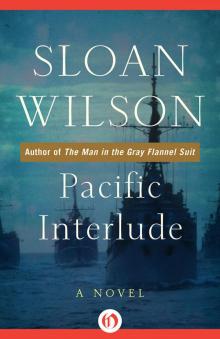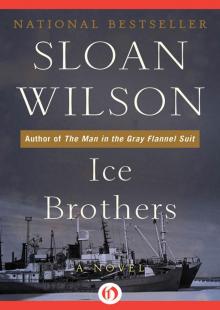- Home
- Sloan Wilson
Pacific Interlude Page 15
Pacific Interlude Read online
Page 15
They call us the grunts, the old doughboys,
The sad sacks, the poor damn GIs,
We live on a diet of mud mixed with blood
And die with green flies on our eyes.
The soldiers on the tank deck cheered. Mostell went on:
But the army’s the strength of the nation,
The outfit that really wins wars.
The navy thinks fame is the name of the game,
That and the chasing of whores.
The Coast Guardsmen, who considered themselves cousins of the navy, booed, the army men approved. Shifting allegiance, Mostell sang:
It’s the navy that wins all the battles
And then puts the soldiers ashore.
So then they get laid and dress up for parade—
They call this the horrors of war.
Then on to other services:
I speak for the leatherneck bastards
The bellboys no sailor calls pal,
But when the army got beat and ran in retreat,
Just who took Guadalcanal?
And:
We’re lucky, we pilots, we flyboys—
We suffer no boredom, no dirt.
We all love to fly so far up in the sky—
It’s the coming down part that can hurt.
There were cheers when Mostell finally got around to his own service:
We Coasties run freighters and tankers—
They’re not much more than a barge,
But with ammo and gas stacked up to our ass,
The hole that we leave can be large!
And all hands joined in when Mostell wound it up with the old chorus:
Fuck ’em all, fuck ’em all, fuck ’em all,
The long, the short and the tall—
There will be no promotion this side of the ocean,
But I still say, my lads, fuck ’em all.
Mostell sat down and accepted a glass of Scotch from Schuman and a cold beer to chase it. He did not sing anymore that night, just got quietly drunk, but for a few minutes he had made the war seem to Syl … and maybe the others … an exercise where fear was no more than an uproarious joke.
CHAPTER 13
THE DECKS OF the Lucky Eighteen were as quiet as a graveyard when Syl returned to her that night. He had drunk too much and the silence confused him until he remembered that Buller had planned to take most of the men ashore to blow off steam, leaving only a skeleton crew to keep an anchor watch. Only Simpson sat brooding on the bridge. As Syl walked none too steadily across the tank deck to their cabin the old mustang gave him a stiff, ironic salute.
He didn’t return it.
At a little after six the next morning Simpson woke up Syl, shaking his shoulder.
“Captain, something crazy is happening. We got to stop it—”
“What?” Syl sat up, shaking his head to clear it.
“A landing barge has come alongside with a whole bunch of gas drums. They want to give us a deck cargo. Who ever heard of a tanker carrying a deck cargo?”
In his slept-in uniform, feeling a little dizzy, he walked to the tank deck. An LCT with a hastily contrived tripod mast and boom was already unloading shiny 52-gallon gray drums.
“Hold that.”
“Skipper, if you don’t like it, see the colonel,” a second lieutenant said. “I’m just following orders.”
“Nobody loads this ship without my permission—”
“Skipper, this is an army ship. We load ’em, you Coasties sail ’em. That’s what the colonel will tell you.”
“We can’t take a deck cargo like that,” Simpson said. “There’s no way we can secure it.”
“Just lash it to the rail,” the lieutenant told him.
“That little handrail won’t hold those drums in a seaway,” Simpson said.
“Captain, nobody wants these gas drums. There’s a general order out saying we can’t put ’em in the LST’s or the freighters—they’ve had too many explosions. We need gas drums to put ashore for the tanks and trucks. You guys are loaded with gas anyway, so why not take some more?”
“Because, damnit, they’ll be impossible to secure. This deck will be swept by green water in a blow.”
“So rig lines. This ain’t no time for safety first.”
Syl glanced over to the other tankers and saw they were accepting gas drums from other landing craft. If he raised hell with the colonel he’d cause nothing but trouble for himself. Seeing him waver, Simpson said, “Skipper, you’ve got to refuse to sail with a cargo like this. The worst they could do is transfer you ashore.”
And then, of course, Simpson would be able to take command and sail, Syl was sure, while he himself sat in a transient officers’ tent, safe but humiliated.
“I don’t give a damn what you do,” the lieutenant said. “My orders are to put these goddamn drums on your deck.”
“We’ll take ’em,” Syl said. “Mr. Simpson, have Cramer secure them as best he can. He can run a line from those forward bitts and tighten it with the stern winch.”
“Cramer ain’t aboard yet,” Simpson said and clenched his teeth before adding, “the rest of the deck gang came back with the motorboat before midnight like I told all hands, but Cramer and Mr. Buller are already six hours late. I’ve no idea how they plan to get back.”
“Did our sailing orders and charts come aboard last night?”
“Yes, sir.”
“Did you look at them?”
“Yes, sir.”
“Did you tell Mr. Buller we have to weigh anchor at nine?”
“Yes, sir. I told all hands.”
“Then Buller and Cramer will figure out a way to get back in time.” (He hoped.) “Meanwhile, roust out the deck gang and see to getting this cargo secured yourself.”
Turning quickly, Syl went back to the wardroom for coffee, which he very badly needed. The fact that he’d gotten drunk the night before instead of returning to his ship to study the detailed convoy instructions made him feel guilty. It also built up his anger at everyone else—the army, Simpson, Buller and Cramer. With everybody fouling up like this—multiply his ship by hundreds—how could any invasion be headed anywhere but to hell and gone?
Come off it, Syl thought as he sat down and sipped his coffee. It was a good bet that throughout history most great voyages had probably begun with men suffering bad hangovers and guilt for a thousand duties not done. The thing to do now was just to get to it.
At seven-thirty Syl went to the flying bridge and studied the harbor with the binoculars but could see no sign of any boat approaching his ship. While there was still time, maybe he should send someone ashore to look for Buller and Cramer. The ship’s motorboat would take at least an hour to go in and back. He could probably borrow Schuman’s fast skiff, but where to look? The officers’ club had been closed for hours and Buller could have wandered with Cramer to any part of the huge base, which sprawled over the whole mountainside. If they had gotten drunk enough, they might now be sleeping it off aboard any ship in the harbor whose crew had let them aboard. They could wake up at sea aboard a destroyer and be damn glad they’d escaped a helpless little gas tanker.
And from Syl’s point of view, maybe that would not be such a bad development. Buller was a troublemaker who’d become dangerously popular with the crew. Cramer was a good chief boatswain’s mate but he would side with Buller in every conflict. The ship would be a hell of a lot more peaceful without them. Eventually replacements would be provided. Meanwhile he and Simpson could take alternate watches until they could train a couple of petty officers to spell them. And with Buller gone, Simpson could bunk with Wydanski, and Syl finally would have a cabin—and more freedom from righteousness—
“Captain, I’d like to take the motorboat aboard now,” Simpson said, and Syl understood that he too would be glad to get rid of Buller and Cramer.
“Take it aboard.”
Syl was impatient to get underway and surprised to realize how intensely he hoped that Bul
ler and Cramer would not get back in time.
At ten minutes to nine Syl put the engine room on standby and told Simpson to start taking in the anchor but not to break it out yet. Going to the flying bridge again, he still could see no sign of a boat approaching. Mostell’s Yankee Yo-Yo was pulling away from Schuman’s Gasoline Alley. The small figure of the captain with the basso profundo voice climbed to the flying bridge and waved at Syl.
“Mr. Simpson, you can break out the anchor now,” Syl said as his watch told him that it was precisely nine o’clock. “When you get it secured, set sea watches. It looks like we’re going to the Philippines.”
The men in the pilothouse gave a cheer, and Syl set a course for the sea buoy outside the mouth of the big harbor, where many ships were now getting underway, the sun flashing on the spray from the hoses they used to wash the last of the New Guinea mud from their anchors as they rose dripping from the water.
The Y-18 had not gone a thousand yards when Syl saw a green skiff like Schuman’s approaching very fast, sending up wings of white spray like a speedboat on a lake, and heard the high-pitched whine of its big outboard. He focused his binoculars and soon was able to make out Buller’s unmistakable bulk in the bow and Cramer in the stern.
“Stop the engine,” he said with a sigh. “Mr. Simpson, stand by to take Mr. Buller and Cramer aboard. My guess is they’ll want us to take up that boat too.”
“Where the hell will we put it?” Simpson asked, gesturing toward the tank deck, which except for a small passageway that had been left in the middle was crowded with gasoline drums.
“Take the motor off and secure the hull on the forecastle head. Those plywood boats are light. The men can muscle it up.”
Before Simpson could argue the skiff came alongside, and Buller and Cramer climbed aboard holding its lines.
“We’ve got a lot of stuff to unload, boys,” Buller said, gesturing toward a pile of cardboard cartons in the middle of the skiff. “Don’t drop it overboard. A lot of it’s beer.”
News which made the men even happier to see Buller return. Thompson, a stout second-class boatswain’s mate, jumped into the skiff and started to pass up the boxes.
“Put them all on the fantail for now,” Simpson shouted. “We’ve got to leave this passageway clear.”
The men soon emptied the skiff, detached the motor and horsed the plywood hull over the tops of the gasoline drums to the forecastle head. Syl resumed speed and soon fell into a line of ships heading out to Point Able, near which several big convoys were making up. The Yankee Yo-Yo and Gasoline Alley followed astern of him, their blunt bows plunging as they cleared the headlands and encountered a steep ocean swell.
“Secure that skiff up there,” Syl shouted. “It’s liable to get washed off.”
Rhinehart, a seaman who looked too young to be out of high school and Murphy, a stocky coxswain about twenty-five years old, ran to do this. After two weeks aboard, Syl was just starting to get the men’s last names right. Still in defiance of custom, Buller called them by first names or nicknames.
“Hey, Bobbie,” Buller now called Rhinehart, “check under the seat of that skiff and see if there’s a case of beer there. We’re missing one.”
“It’s here!” Rhinehart piped in a boyish voice.
“You can put it in the forecastle,” Buller shouted.
“The hell you can,” Simpson called. “I want all beer stowed in the lazaret. They’ll be no drinking at sea.”
He glanced at Syl to see if this order would be countermanded.
“That’s right,” Syl said. “Save the stuff for a beer bust ashore.”
The men groaned. Perhaps by accident, perhaps not, Rhinehart dropped the case as he carried it aft, and golden cans rolled along the passageway between rows of oil drums. Whooping, the crew scrambled after them.
“Put that damn beer in the lazaret, every can of it,” Simpson ordered.
Instead, the men began playing catch with the cans which glittered as they flashed about in the bright sunlight.
“Stow it,” Simpson said, face turning red.
“Simp, we ain’t drinking the stuff,” Buller said as he neatly fielded a can in his huge right hand. “Is there any law what says you can’t throw beer cans around a ship?”
“Never mind the Simp,” the executive officer said. “And I want every can of that stuff stowed immediately or I’ll put you all on report.”
The men obliged by throwing most of the cans toward the men on the fantail, but one hit the side of the pilothouse and burst, spraying the green paint with white foam.
No more of the shining missies flew through the air, but more went into bulging pockets than into the lazaret.
“Hey, Murph,” Buller shouted to the coxswain, who was still standing by the skiff on the boy, “catch this one.”
“No more,” Simpson said.
Buller wound up and delivered his pitch anyway, but it turned out that he had nothing in his hand. Falling into the spirit of this game, Murphy leaped into the air and pantomimed a miraculous catch. Soon the whole crew was laughing and acting out a comic baseball ballet, throwing and catching nothing but air as Simpson turned and beat a stiff retreat to the flying bridge.
This might be an unruly crew, but it was also one, Syl felt, with guts and spirit. What was really so bad about some horseplay for men setting out to ride gasoline into a major battle. To hell with Simpson … Syl was soon playing umpire as the invisible ball flew back to Buller, and Cramer pretended to slide home at his feet.
“Safe,” Syl shouted, throwing out his arms. “Safe at home plate!”
It all beat facing the truth of what lay ahead. It beat pissing in one’s pants.
Syl’s moment of unreal euphoria did not last long and neither did the crew’s. As the twenty-four small ships which joined convoy Charlie Fox Able formed up, every one of them, even a tug with five two-thousand-ton barges, flew the red Baker flag, showing that they were carrying either ammunition or gasoline. They were such a decrepit-looking collection of rusty hulls that they looked as though they ought to be sailing to the ship breakers, not to battle. Even the destroyer Talbot, which escorted them, was a four-piper left over from the First World War and looked so seaworn that Syl wondered whether she had somehow got lost in the Battle of Jutland and had been wandering around looking for home ever since. This sad collection of floating junk appeared even more pathetic compared to the enormous convoys of new ships which kept speeding past them, their flanks protected by powerful new destroyers, sleek cruisers and small aircraft carriers. On the horizon a parade of battleships and aircraft carriers outdistanced them all. Feeling like a gaggle of ragamuffins following a parade, convoy Charlie Fox Able limped along, unable to make good even its scheduled eight knots against growing head seas.
“It looks like they put all their rotten eggs in one basket,” Buller observed. “Still, what Jap would bother with us when all these big boys are out looking for trouble?”
At the moment Syl was not worried about Japs. The gas drums jiggled and danced in their lashings as the ship pitched and yawed in a corkscrew roll. While he was studying their movements, he realized that the whole hull was flexing dangerously. It humped perceptibly in the middle on the crest of the seas and sagged in the troughs.
Simpson observed, “She’s mighty limber, ain’t she? Captain Carlson used to call her the Flexible Flyer.”
“What makes her do it, do you know?”
“Didn’t I tell you that with the seawater eating from the outside and the gas from within, her plates have worn mighty thin?” And then, with an air of something like triumph, Simpson turned and went back to the flying bridge. Syl stood there watching the working of the hull in these steep but still moderate seas. How long could metal be bent back and forth like that before breaking, and what would happen if they hit really tough weather?
Seeing the worried expression on Syl’s face, Buller came from the pilothouse and stood near him on the wing of the bridge.
/> “You worried about us having the bends?” he asked with a grin.
“I am. That’s part of my job—”
“Wydanski said he doesn’t think it’s anything to worry about. That crazy old Polack don’t know much, but he spent a lot of time aboard tankers back in the days when they had steam. He says most tankers have a lot of give in them. He’s been on ships where the masts whipped back and forth so much they busted the radio aerial.”
“I’ve heard of that on big tankers. Not on one this size.”
“Well, I know some of those big old tankers keep going for thirty or forty years down in the Gulf. If their plates can take the punishment so long, why not ours?”
Perhaps because big tankers would have much thicker plates than small ones, Syl thought, but he’d try not to spread his pessimism. He wished that he had drilled the hull or found some more sophisticated way to determine its strength before leaving Australia. Spilt milk now. Forget it. As a matter of fact, it was pointless to stand here watching this Flexible Flyer do her odd little shimmy. If she wanted to break up, she’d break up and there was not a damn thing he could do about it. The gas drums, however, needed to have their lashings tightened up and he told Cramer to do just that and went to his cabin.
Where a new surprise waited for him. Buller had brought mail aboard and had put it on his bunk. Almost a hundred letters that had been following Syl around for three months had finally caught up with him. Most of them were from Sally, who had gotten into a nostalgic mood and begun writing to him almost every day. Her small white envelopes covered his graying sheet like a blizzard. Ever since his encounters with Angel and Teddy, he had been feeling some guilt whenever he thought about Sally, and this evidence of her apparent devotion while he was betraying her in Brisbane made him feel worse. He still hadn’t fully recovered from his hangover and his head began to throb again. Simpson had recently applied a pungent new salve to the athlete’s foot between his toes and the whole cabin reeked with a strong medicinal smell. As the helmsman wandered from his course the vessel took a particularly vicious series of rolls and Syl staggered, bracing himself with both hands on his desk. Right now he couldn’t read a hundred letters from his lonely wife in Stamford, Connecticut, the trials of the insurance business and her hopes for “settling down” in the future. Future? He headed for the head.

 A Summer Place
A Summer Place Pacific Interlude
Pacific Interlude Man in the Gray Flannel Suit
Man in the Gray Flannel Suit Ice Brothers
Ice Brothers